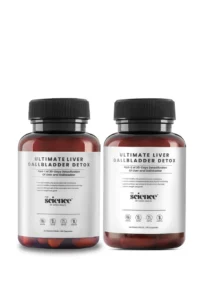If you have ever received a blood test report and found the term SGPT mentioned, you may have asked yourself what is SGPT in liver and why is it so important. The simple explanation is that SGPT is an enzyme found in the liver which helps in protein metabolism and energy production. When the liver becomes stressed or damaged, SGPT levels rise, making it one of the most reliable indicators of liver health.
Your liver is the body’s natural detox center. It processes nutrients from food, stores energy, filters toxins, and plays a central role in overall well-being. Any damage to the liver can silently progress without clear symptoms, but SGPT levels provide an early signal. This is why knowing what is SGPT in liver and understanding how it works is vital for taking preventive steps and maintaining good health.
What is SGPT in Liver?
SGPT, also called Serum Glutamate Pyruvate Transaminase, or medically known as Alanine Aminotransferase (ALT), is an enzyme primarily located in liver cells. It is also present in smaller amounts in the kidneys, muscles, and heart. However, its main concentration is within the liver, making it a direct marker of liver function.
To answer the question what is SGPT in liver, it is essentially an enzyme that assists in breaking down proteins into energy that your body can use. Under normal conditions, only a small amount of SGPT is released into the blood. However, when liver cells become inflamed, injured, or damaged, the enzyme leaks into the bloodstream, causing SGPT levels to increase.
Doctors frequently check SGPT through liver function tests because it reflects how healthy or stressed the liver is. Simply put, when you ask what is SGPT in liver, you are asking about a key indicator that helps detect liver health before the damage becomes severe.
Normal Range of SGPT Levels
Understanding the normal range is essential when discussing what is SGPT in liver. While the exact numbers may vary slightly depending on the laboratory and patient’s age or gender, medical experts generally agree on the following ranges:
- For adult men: between 10 to 55 units per liter of blood
- For adult women: between 7 to 45 units per liter
- For children: usually between 5 to 30 units per liter
- For elderly adults: levels may be slightly lower compared to younger individuals
If SGPT is higher than the normal range, it may indicate conditions such as fatty liver, hepatitis, or even early cirrhosis. On the other hand, a very low SGPT level, though rare, may suggest a deficiency of vitamin B6 or poor nutritional health.
When people ask what is SGPT in liver, it is important to remember that the answer is not just about its role but also about knowing how to interpret the numbers. Staying within the healthy range ensures that your liver is functioning optimally.
Causes of High SGPT Levels
Once you understand what is SGPT in liver, the next step is to know why SGPT levels rise. High SGPT levels usually indicate that the liver is under stress. This stress can come from multiple causes, which can be divided into three broad categories:
Liver-related causes
- Fatty liver disease, which may be linked to obesity or alcohol use
- Viral infections such as hepatitis A, B, or C
- Chronic conditions like cirrhosis or fibrosis of the liver
- Obstruction in the bile ducts leading to jaundice
Lifestyle-related causes
- Excessive alcohol consumption that damages liver cells
- Poor dietary habits leading to obesity and metabolic syndrome
- Uncontrolled diabetes which burdens the liver
- Overuse of medications such as antibiotics, cholesterol-lowering drugs, or painkillers
Non-liver causes
- Strenuous exercise which temporarily raises enzyme levels
- Muscle injuries that release similar enzymes
- Certain heart conditions that put stress on the body
So when we ask what is SGPT in liver and why it increases, the answer often lies in a mix of lifestyle, medical conditions, and sometimes temporary physical stress.
Symptoms of Elevated SGPT Levels
One of the most concerning aspects of SGPT is that elevated levels may not always show immediate symptoms. This is why people who wonder what is SGPT in liver must also understand that it can silently indicate underlying damage before physical discomfort begins.
Common signs that may eventually appear include:
- Persistent fatigue and lack of energy
- Nausea, indigestion, or unexplained vomiting
- Pain or discomfort in the upper right side of the abdomen
- Loss of appetite or sudden weight changes
- Yellowing of the skin or eyes which signals jaundice
- Swelling in the abdomen or legs due to fluid retention
By the time these symptoms appear, liver damage may already be progressing. Therefore, routine testing is essential. Understanding what is SGPT in liver means realizing that the enzyme acts as an early messenger for silent conditions.
Why Regular SGPT Monitoring Matters
Many people only learn about SGPT after a health issue arises, but in reality, regular monitoring is crucial. When someone asks what is SGPT in liver and why should it be checked, the answer lies in its role as a preventive measure.
Regular SGPT monitoring helps in:
- Detecting liver conditions such as fatty liver, hepatitis, or cirrhosis at an early stage
- Tracking whether treatment or lifestyle changes are improving liver function
- Preventing complications that may arise from undiagnosed liver problems, including chronic liver disease or failure
By consistently monitoring your enzyme levels, you give yourself the opportunity to address small issues before they turn into major health risks. This is why knowing what is SGPT in liver and checking it periodically is essential for long-term wellness.
SGPT vs SGOT – Understanding the Difference
When discussing what is SGPT in liver, another common term that appears is SGOT, also known as AST (Aspartate Aminotransferase). Both are enzymes, but their presence and significance differ.
- SGPT (ALT) is mainly concentrated in the liver, which makes it more specific to liver health.
- SGOT (AST) is found in the liver but also in the heart, muscles, and kidneys. This means high SGOT levels could indicate not only liver problems but also heart or muscle conditions.
- Doctors often calculate the ratio of SGOT to SGPT, also called the AST to ALT ratio. This ratio helps in identifying whether liver damage is due to alcohol use, chronic disease, or another underlying reason
So while both enzymes are measured together, if the question is what is SGPT in liver, the direct answer is that SGPT provides a more specific picture of liver health compared to SGOT.
Natural Ways to Maintain Healthy SGPT Levels
A very important aspect of learning what is SGPT in liver is understanding how to keep it within the healthy range naturally. While medical treatment may be required for serious conditions, lifestyle and dietary changes play a powerful role in protecting your liver.
Dietary Recommendations
- Increase intake of fresh vegetables, especially leafy greens like spinach and kale
- Add foods rich in omega-3 fatty acids such as salmon, walnuts, and flaxseeds
- Include antioxidant-rich foods like berries, turmeric, and green tea
- Avoid fried, processed, and high-sugar foods that burden the liver
Lifestyle Changes
- Avoid alcohol or limit consumption to the minimum possible
- Exercise regularly but avoid overexertion that may temporarily raise enzymes
- Maintain a healthy body weight to prevent fatty liver disease
- Prioritize adequate sleep and stress management
Medical Guidance
- Do not take unnecessary medicines or self-prescribe supplements
- Regularly consult with a healthcare provider if SGPT levels remain elevated
- Manage underlying conditions such as diabetes or high cholesterol
Ultimately, when people ask what is SGPT in liver and how to maintain it, the answer lies in consistent healthy living supported by professional medical advice.
Conclusion
Your liver plays an essential role in maintaining overall wellness, and SGPT is one of the key markers of its health. Understanding what is SGPT in liver means recognizing that it is an enzyme which helps detect liver damage early, often before visible symptoms develop. By monitoring your levels, making lifestyle adjustments, and seeking medical guidance when necessary, you can protect your liver and ensure long-term vitality.
If your SGPT levels are worrying you, do not wait for symptoms to appear. At Smriti Kochar’s Ultra-Wellness Program, we focus on restoring liver health naturally. No heavy medicines, only science-backed interventions and lifestyle strategies that truly heal. Start your healing journey today and unlock the healthiest version of yourself. Start Your Healing Journey Now
Read Our Latest Blogs
Is An Enlarged Liver Dangerous | How To Clean Liver Naturally | Is Grade 2 Fatty Liver Dangerous | How To Detox Liver Naturally At Home | Is Eggs Good For Fatty Liver | What Is Grade 1 Fatty Liver |Is Curd Good For Fatty Liver | Is Milk Good For Fatty Liver | Is Sugarcane Juice Good For Liver | Is Beer Good For Liver | Is Coconut Water Good For Liver
Frequently Asked Questions (FAQs)
SGPT is an enzyme measured in liver function tests to evaluate how well the liver is working. Elevated levels often suggest liver stress or damage.
Yes, many cases of high SGPT can improve naturally with lifestyle changes such as a healthy diet, weight management, reduced alcohol intake, and regular exercise.
If you have no risk factors, testing once a year during a routine health check is sufficient. If you have conditions like diabetes, obesity, or hepatitis, your doctor may recommend more frequent testing.
No, while liver disease is the most common cause, SGPT may also rise due to exercise, certain medications, or muscle injury. Proper evaluation is necessary.
Yes, although less common, children may have high SGPT levels due to infections, side effects of medication, or obesity-related liver conditions.
Foods rich in antioxidants, green leafy vegetables, turmeric, green tea, and vitamin E-rich foods such as almonds and sunflower seeds are beneficial.
Indirectly yes. When SGPT is elevated due to liver stress, the body may experience fatigue and weakness because the liver is not working efficiently.
SGPT is more specific to the liver, while SGOT is found in both the liver and other organs such as the heart and muscles. Together, they provide a clearer picture of health.





